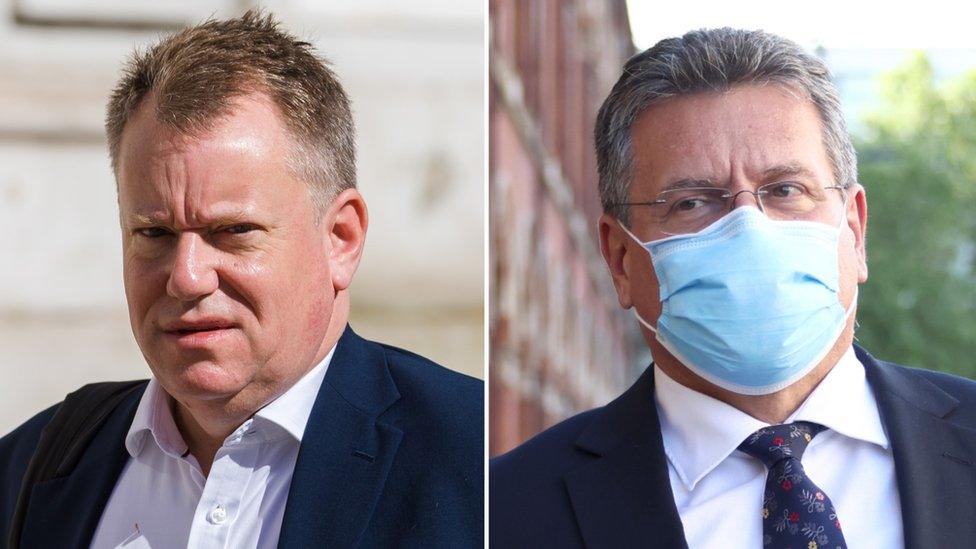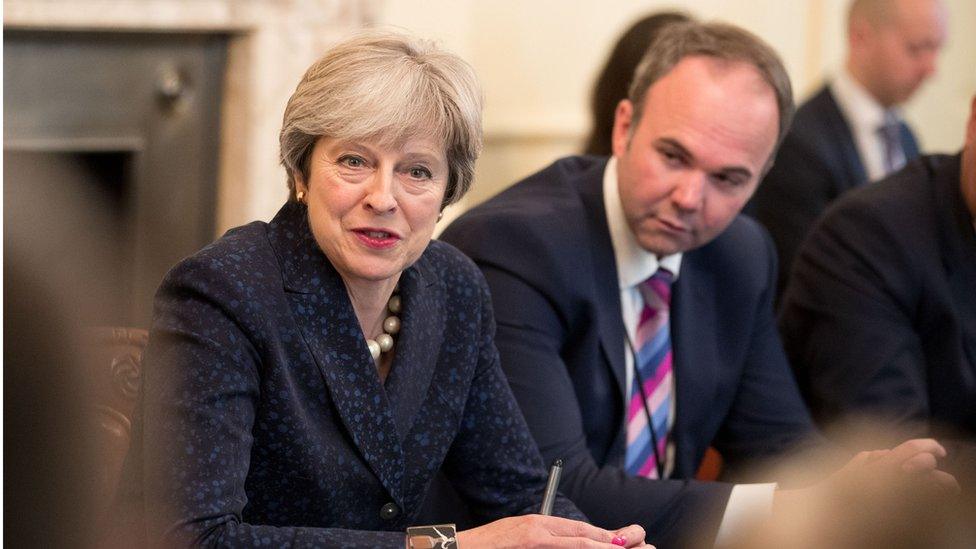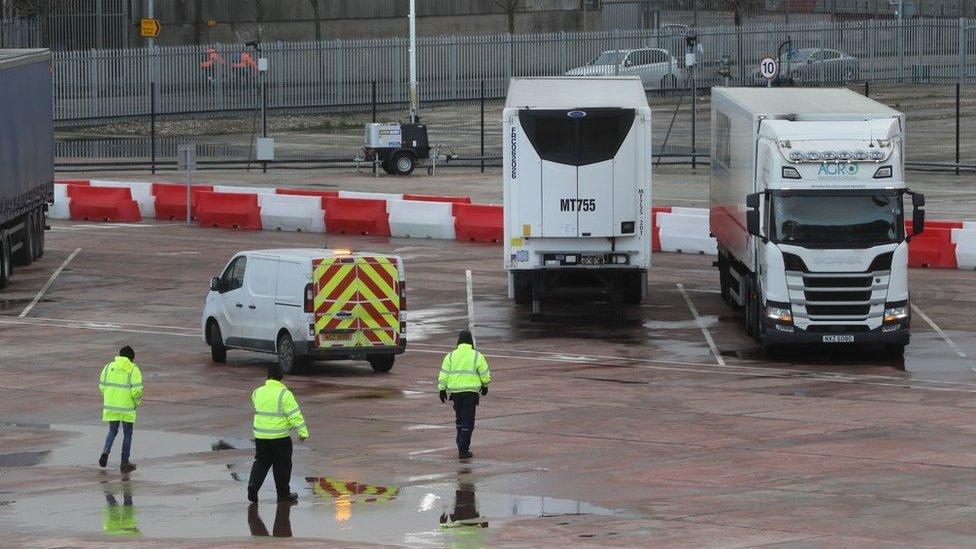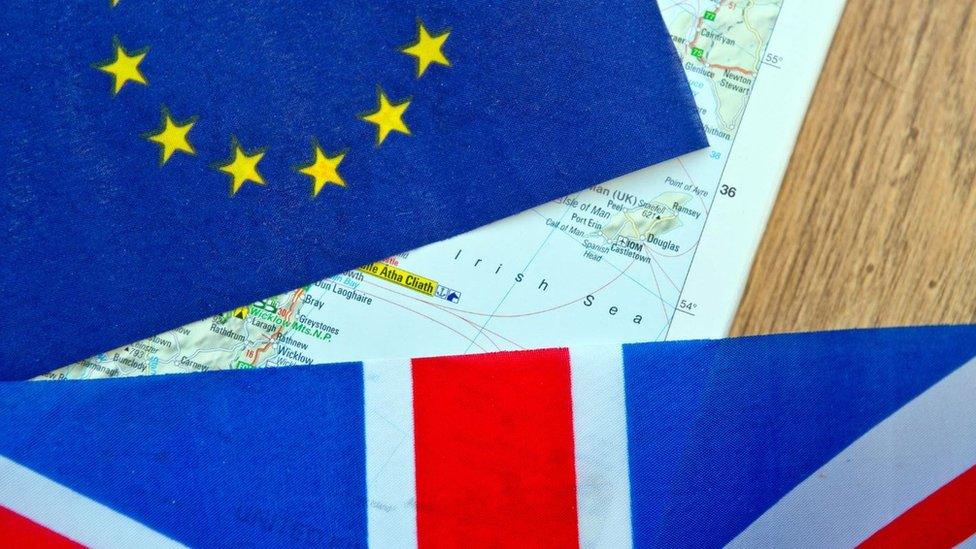Brexit: Gulf remains between UK and EU over Brexit protocol
- Published

Talks have been taking place on the NI Protocol which created a trade border in the Irish Sea
As his press conference wore on, Maros Sefcovic sounded increasingly frustrated.
The European Commission vice president had spent Wednesday morning in a meeting with Lord Frost, the UK's Brexit Minister.
The meeting to discuss the implementation of the Northern Ireland Protocol has been described by some sources as "brutal" or "a car crash".
Mr Sefcovic said it had been a very difficult discussion.
He told the media that earlier in the process the EU had suggested things the UK could do to simplify export certification for some products going from GB to Northern Ireland.
"Do you think at least one of these things was done?," he asked.
"None. Nothing has materialised."
This is typical of how the EU sees the UK's willingness to implement the protocol; moving too slowly and so needlessly exacerbating problems.
The UK bristles at this.
Writing for the Financial Times this week, Lord Frost said: "We enforce EU law in Northern Ireland as required. We take no lectures on whether we are implementing the protocol; we are."
But aside from disagreement about operational detail, it is clear there is now a gulf between the two sides on how the protocol should be interpreted.

Lord Frost (L) has been discussing border issues with his EU counterpart Maros Sefcovic in central London
The protocol was agreed by the UK and EU in October 2019 and was subjected to further negotiation and agreement last year.
Its fundamental aim is to prevent a hardening of the land border between the two parts of island.
It does that by keeping Northern Ireland in the EU single market for goods, meaning products arriving from GB need paperwork and some, particularly food, are subject to checks.
It was well understood in the UK Civil Service, if not among all MPs, that this was going to mean a substantial trade border which would increase cost and complexity for internal UK trade.
The text of the protocol contains 40 pages of EU directives and regulations which continue to apply in Northern Ireland.
That is the letter of the agreement. But UK ministers are increasingly focused on what they see as the spirit of the agreement.
For them, that spirit can be found in the preamble to the protocol where one section reads: "The application of this protocol should impact as little as possible on the every day life of communities in both Ireland and Northern Ireland."
On that basis, the current range of checks and controls does not come up to the mark and the operational impact of the protocol should be radically changed.
Trust is 'in short supply'
Lord Frost put it like this in the Financial Times: "In 2019 we agreed, as a huge compromise and for the greater good, to control certain goods' movements within our own country and customs territory.
"If that situation is not to be totally unsustainable we need to be able to do so in ways which do not disrupt every day life and which respect everyone's identity and interests."
The EU sees this approach as infuriatingly reductive and an attempt to walk back the whole premise of the agreement.
French President Emmanuel Macron robustly articulated that view ahead of the G7 summit.
"We have a protocol," he said. "If, after six months, you say we cannot respect what was negotiated, then that says nothing can be respected.
"I believe in the weight of a treaty, I believe in taking a serious approach. Nothing is negotiable. Everything is applicable."
Despite those tough words, technical talks between EU and UK officials will continue and progress is being made on easing some parts of the protocol.
Outside those talks, other well-informed observers continue to offer ideas.
Anton Spisak, a former UK Brexit official, has suggested a risk-based scheme which could offer a way to sharply reduce, external the need to check goods going from GB-NI.
But any scheme of that sort involves the EU investing a large amount of trust in the UK and for now trust is in short supply.
Related topics
- Published7 June 2021

- Published7 May 2021

- Published23 January 2021

- Published2 February 2024

- Published5 June 2020
